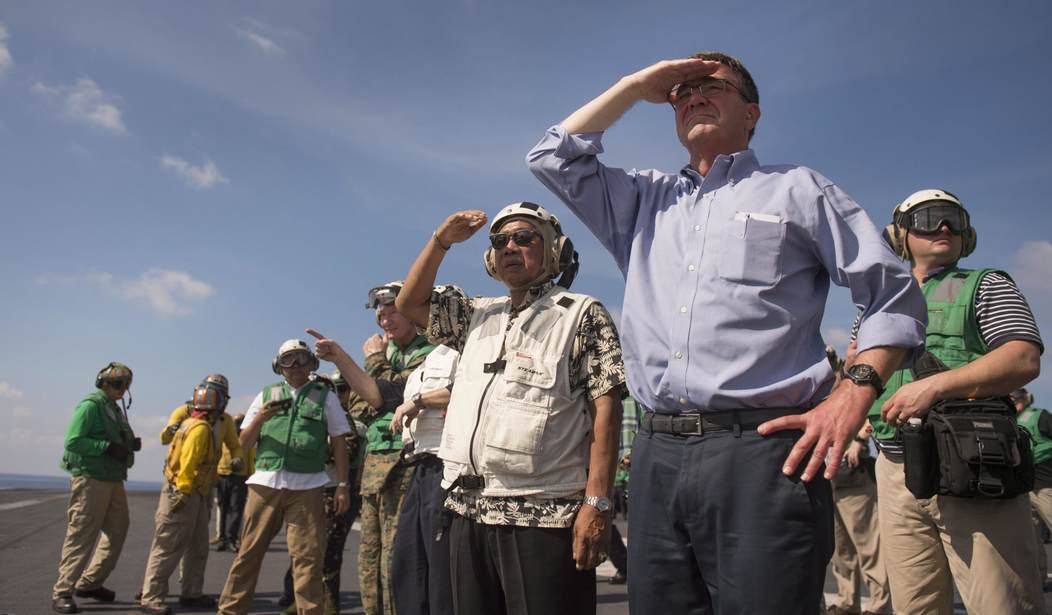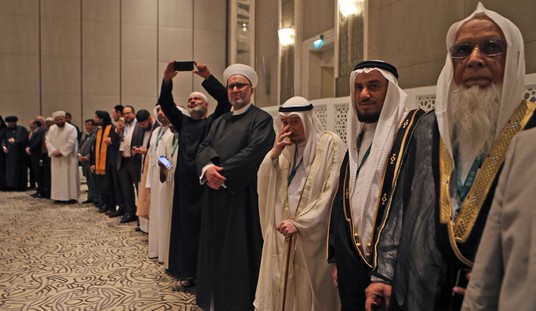In a chat with troops aboard the USS John C. Stennis, Defense Secretary Ashton Carter characterized China’s cyber warfare not as attacks but as “cyber misbehavior.”
The aircraft carrier is in the disputed South China Sea. “You play an essential and pivotal role in this region, which I’ll discuss in a moment, but you and the rest of the American military do that, and everything else around the world, in a principled and respectful way. You don’t intimidate people, coerce people or exclude people,” Carter said during the troop event. “Instead the American style has always been to include people in protecting us all. That’s what you’re doing right now.”
Carter was asked what the U.S. government is doing to prevent cyberattacks from China, something China denies it does but that has affected corporations, defense contractors and government systems.
“China is one of actually many countries that we have found engaging in cyber misbehavior. I don’t want to call it an attack, because some of it is about robbing industrial secrets and that sort of thing, and it’s just one — I want to make that point, but since your question is about China, actually there we may have made some progress forward, because when the two presidents were together, now six months ago or so, they reached an agreement to stop doing that, and we’re watching and seeing if that agreement is honored,” he said, referring to last year’s agreement that lawmakers warned was based on hollow promises.
“With that said — and that’s good and that’s positive, but that’s China; it doesn’t take care of everybody else around the world.”
The Defense secretary said “we’ve got to be good at defending our networks, but you can’t count on anybody not to try to exploit networks as a way of creating vulnerability for you.”
“Now that’s most important in our networks in the Defense Department, the networks that you depend on here. They’re the ones we most need to defend. And we’re making huge investments in that, both dollars and really good people, talented people — maybe you’re one of them. And additionally we — that is the Defense Department, we try to help the broader society to defend itself against cyberattacks,” he continued.
“Some of this is just from pranks. Some of it is from companies trying to steal their secrets and some of it is by people who want to do damage, including governments that want to have the ability to do damage, so whatever it — wherever it comes from, we’ve got to be able to defend ourselves in the first instance, and then, people ought to know that if you attack us — I don’t care how you attack us — cyber or whatever, an attack is an attack — and we’re going to respond. Not necessarily in cyber, but we’ll respond in the way we choose. But you’ll be sorry you did it.”
The next questioner noted to the Defense secretary that “China’s misbehaving right now,” and given that fact why did the U.S. allow China to participate in the Rim of the Pacific Exercise (RIMPAC), the world’s largest international maritime warfare exercise held this summer in Hawaii?
“You’re right to use the word ‘allow,’ because actually we issued the invitations, and we have not taken the step of disinviting them. And I’ll give you some of the logic behind that. Our approach to security in the region, as I indicated there, has always been to try to include everyone, so that’s our basic approach. So we — even as we stand strong, and improve all of our systems and stand strong with our allies, and develop new partnerships with countries like India and Vietnam that we didn’t — we don’t have decades of experience with, like the Philippines. They’re all coming to us, in part because they’re concerned about China,” Carter replied.
“But we’re still taking the approach of, — that everybody ought to work together here, so if the Chinese want to participate, I think it’s the right place for us to be. Come on, and instead of standing apart from everybody and isolating yourself and excluding yourself, try to be part of the system of cooperative nations that have made, as I said, the Asian miracle possible,” he continued.
“And remember, it’s been very good for the United States also in every way. So that’s the reason for now.”









Join the conversation as a VIP Member